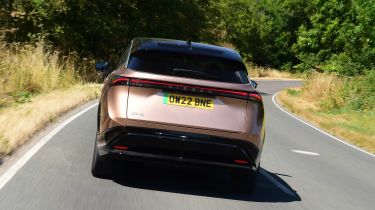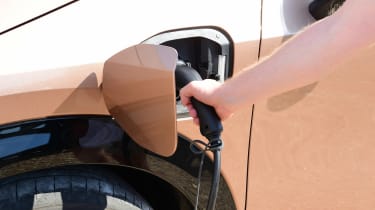Nissan Ariya SUV - Range, charging & running costs
New trims have made the Nissan Ariya more affordable, but it’s the mid-spec models that offer the most range
Nissan is first and foremost a mainstream brand, so the Ariya is somewhat of an outlier in terms of market positioning. However, a range shake-up in mid-2023 brought in a series of price cuts, as well as a more affordable ‘Engage’ trim level, which saw the SUV’s starting figure drop below £40,000 for the first time. That means it now undercuts the ever-popular Tesla Model Y, and puts it on par with key rivals like the Skoda Enyaq.
At launch, Nissan is offering the Ariya with a choice of two battery sizes: 63kWh and 87kWh – and this is still the case 12 months down the line. Nissan claims the former will allow for up to 250 miles of driving on a single charge, while the latter will be able to manage a maximum of 329 miles (spec dependent) before you need to plug it in.
| Model | Battery size | Range |
| 63kWh Engage/Advance/Evolve | 63kWh | 250 miles |
| 87kWh Engage/Advance/Evolve | 87kWh | 329 miles |
| e-4ORCE 87kWh Advance/Evolve | 87kWh | 319 miles |
| e-4ORCE 87kWh Evolve+ | 87kWh | 310 miles |
| e-4ORCE 87kWh Nismo | 87kWh | 261 miles |
During our test drive of the smaller battery option we were able to easily extract around 235 miles; drivers with a lighter right foot may be able to squeeze out even more. This equates to an efficiency figure of around 3.7 miles/kWh. These figures are about the same as what can be expected from rivals; the 58kWh Enyaq quotes around 258 miles. However, the Toyota bZ4X can travel over 300 miles even in base specification.
We’ve also sampled the 87kWh version with front-wheel drive, which commands a premium of around £5,000 depending on exactly which version you go for. Unless you really need to drive long distances, or don’t have any way to charge at home, the 63kWh likely represents better value.
Basic Ariyas get a 7.4kW (AC) on-board charger, allowing for a full charge overnight using a standard home wallbox. Higher-spec models better this with a 22kW on-board charger, enabling use of faster AC charge points, though this type of charger is less common.
Regardless, all Ariya models get 130kW (DC) rapid charging, for a 20-80% in under 30 minutes when connected to a compatible public charger. This isn’t bad, but quite a few rivals can charge more quickly, including the Kia EV6 that can accept over 200kW. The sat nav can suggest charging stops along your route if necessary, and precondition the battery so it’s in its optimum state for fast charging when you arrive at a chargepoint.
One standard feature that is often an optional extra on most EVs at this price point is a heat pump. This compresses refrigerant to warm air passing through from the outside, reducing the need to use the car’s electric heating system. Consequently, range is improved in winter months where a portion of the car’s charge would have instead been used to power the heater.
Otherwise, the Nissan Ariya benefits from all the usual perks of EV driving; no road tax (VED) until 2025, exemption from low-emission zones and the London Congestion Charge, plus rock-bottom Benefit-in-Kind (BiK) company-car tax. Sitting in the lowest 2% bracket, you’ll save a fortune versus the equivalent Nissan Qashqai.
Insurance groups
Insurance ratings for the Nissan Ariya start from group 31, which is pretty reasonable. The bigger battery commands a two-group premium, while climbing up through the specs also adds to the price you’ll pay. Top-spec Evolve+ cars with all the bells and whistles sit in group 42, which is more than the equivalent Skoda Enyaq vRS, but less than any Tesla Model Y.










